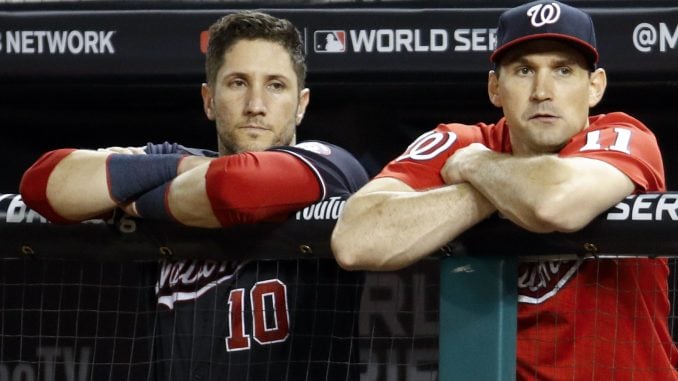
WASHINGTON, D.C. — Root, root, root for the home team. If they don’t win, it’s the same.
That’s been the case for the 2019 World Series, where the home fans went home disappointed in the first five games, heading into Tuesday’s Game 6 in Houston.
The Washington Nationals appeared to take a stranglehold in the Series by winning the first two games in Houston, beating Astros aces Gerrit Cole and Justin Verlander on back-to-back nights. That brought the World Series back to D.C., where Washington hoped to wrap things up.
Instead, with the city hosting its first World Series games in 86 years, the Astros made a stand, sweeping the three games by scores of 4-1, 8-1 and 7-1.
“We took a pretty heavy punch in the gut when it came to the first two games,” Houston manager A.J. Hinch said. “The Nats came out hot. They won a close game then they blew us out late. And then you take a step back, and you’re like, ‘We’re still in the World Series, and it’s still a race to four wins.’ You win that first win. I said that I think the vibe was going to start to pick up a little bit and there was going to be some questions about this Series once we win the first game. And then we win the second game here. And then today we come out and separate ourselves a little bit.”
Through five games, the home teams were getting dominated. The road warriors outscored them by a combined score of 36-10. The hits were 57-36 in favor of the road teams, and home runs were even more one-sided, with road teams hitting 11 of the 14 in the Series.
The Nationals, who were 3-0 in this postseason when facing elimination heading into Game 6, have embraced the approach of not looking too far ahead. After the two big wins in Houston, manager Dave Martinez continued to preach the “1-0 approach.”

“We talked about complacency,” Martinez said. “I don’t think our guys would ever do that, but we said, ‘Hey, we’ve still got a lot of baseball left. We’ve just got to focus on today and go home, rest and get ready to play and go 1-0 again.’ That’s been the message all year. We don’t try to get ahead of ourselves. These guys need to understand the focus on the here and now, and do the little things. That’s what’s got us here. And we’ve got to continue to do that.”
After instead going 0-1 on three straight nights, the Nationals still focused on what was right in front of them, instead of the big picture.
“You know, right now my focus is on Game 6. We’ve got to treat that as Game 7 right now. There won’t be a Game 7 if we can’t get a Game 6. So our focus is winning tomorrow and go 1-0 and go from there,” he said.
The Astros, meanwhile, credited their comeback to rediscovering their swagger.
“I don’t think we tweaked anything, but we started to bring our personality back,” Hinch said. “We started to bring our run production back. We started playing from ahead, that was the key for us, this three games in Washington. And subsequently we — our pitching staff decided not to give up very many runs. And combine those things and we come away with three wins.”
The result is a World Series that, in five games, has tied a pair of records for road team dominance.
It’s just the 15th time in the 115-year history of the Series that road teams have won five games. It happened most recently in the Cubs-Indians Series in 2016, and it’s just the third time it’s happened in 40 years.
This is only the third time that road teams have won the first five games of a World Series. The 1906 all-Chicago World Series between the White Sox and Cubs matched it before the White Sox won at home to clinch the Series in Game 6. The same thing happened in 1996, with the Yankees and Braves winning the first five games at the other team’s park, before the Yankees won in Game 6 at home to wrap things up.
The Nationals headed into Tuesday’s game hoping to break from that history.
“Pretty much everybody eliminated us from the season in May,” catcher Kurt Suzuki said. “So we’ve kind of been playing like every game was an elimination game since then. We’ve just got to go out there and play baseball, man. We can’t control the future. We just control what’s at present right now, and that’s going out there and competing.”



